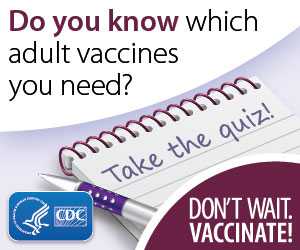10 Reasons To Get Vaccinated
 There are many important reasons to get vaccinated. Talk to your doctor to make sure you are up to date on the vaccines that are right for you.
There are many important reasons to get vaccinated. Talk to your doctor to make sure you are up to date on the vaccines that are right for you.
Did you know that adults need vaccines too? If you didn’t, you are not alone. Many adults in the U.S. are not aware of the vaccines recommended for them – and that means they are not taking advantage of the best protection available against a number of serious diseases. Talk to your doctor to make sure you are up to date on the vaccines that are right for you.
There are many reasons to get vaccinated; here are just 10.
- You may be at risk for serious diseases that could be prevented by vaccines. Many of these diseases (like influenza, pertussis, and shingles) are common in the U.S., and many can be spread easily.
- You may be at increased risk for complications from certain diseases if you have a chronic health condition or weakened immune system. Adults with chronic conditions such as heart disease, diabetes, or lung disease and those with weakened immune systems are more likely to develop complications from certain vaccine-preventable diseases. These complications can include long-term illness, hospitalization, and even death.
- You can reduce the chance that you’ll pass on a serious disease to your loved ones. Most vaccine-preventable disease can be contagious, like influenza, meningitis, and whooping cough. Receiving your recommended vaccines can reduce the risk that you get sick and spread disease on to others.
- You can help protect those who can’t get vaccinated. Some people may not be able to get certain vaccines based on age, health conditions, or other factors even though they are vulnerable to illness. Vaccines can help prevent the spread of contagious diseases to them. For example, newborns who are too young to get vaccinated for whooping cough are also most at risk of severe illness from the disease. By getting vaccinated when you’re pregnant, you can pass on protection to your baby.
- You don’t have time to get sick . You have too much responsibility to risk getting sick, including people counting on you at work and at home. Vaccines can help you stay healthy so you don’t waste time being sick.
- You don’t want to miss what’s important to you. Spending time with family and friends or taking time out for your hobbies may not be possible if you get sick. Vaccines can help you stay healthy and enjoy the things you like to do.
- You don’t want to pay the price of getting sick. Adults who get a vaccine-preventable disease face the financial costs of medical visits and treatment, in addition to other costs like taking time off work, hiring babysitters, and traveling to and from doctors’ offices.
- You like to travel – or have to travel for work. Travel can present exciting opportunities, but it can also put you at risk for certain diseases. Make sure you only bring back great memories, not illness! If you are going to travel internationally, you might need additional vaccines. See the vaccinations and travel checklist.
- You want the peace of mind that comes with protecting your health. People sometimes wait to get vaccines until they hear of outbreaks of disease like pertussis or influenza in their community. The time to be vaccinated is before disease arrives. It’s important to stay up to date on your immunizations because no one can predict when disease will appear.
- You don’t want to feel crummy if you can prevent it! No one wants to feel sick. There are more than a dozen diseases that you can protect against simply by getting vaccinated! Adult vaccines are available at doctor’s offices, health departments, pharmacies, and even workplaces.
Take the next steps to protect your health and get vaccinated:
- Take our vaccination quiz to find out which vaccines are recommended for you and discuss your results with your healthcare professional during your next appointment.
- Find a vaccine provider near you .
- Share your reason for getting vaccinated with family and friends!
Don’t wait. Vaccinate!
- Page last reviewed: January 9, 2017
- Page last updated: January 9, 2017
- Content source:
- National Center for Immunizations and Respiratory Diseases
- Page maintained by: Office of the Associate Director for Communication, Digital Media Branch, Division of Public Affairs




 ShareCompartir
ShareCompartir
